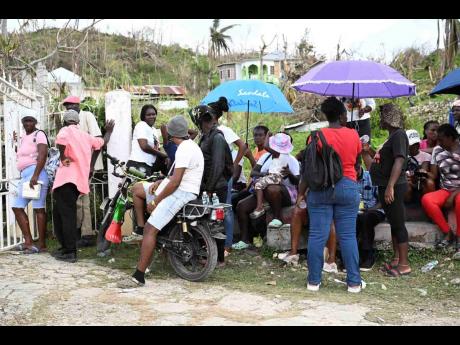Kristen Gyles | Not doing anything?
Over the weekend, I visited a hospital in Kingston and happened to have a discussion with a doctor who was on duty. The doctor was fully dressed in army gear and was clearly an employee of the JDF. While we spoke, he shared that due to the extensive need for medical services across the island considering all the damage caused by Hurricane Melissa, he had not been back to his home in St Catherine since the hurricane. He is just one of countless military personnel who have been working tirelessly to help restore stability since the October 28 destruction.
Since that discussion, I have seen and heard commentary querying why the government doesn’t utilise the JDF in the national hurricane relief efforts. Oh boy.
I also had a discussion with someone recently who lamented the inaction of politicians, and particularly members of parliament (MPs), who he suggested were uncaring and unsympathetic to the plight of their suffering constituents, who according to him have gotten no help from the government since the hurricane.
Since that discussion, I came across a news feature which highlighted the altruism of some politicians who have donated millions of dollars of personal funds to provide relief supplies, including care packages, to residents in western parishes which were most severely affected by the hurricane. I’ve also seen news of MPs across the political divide collaborating to provide government aid to badly affected communities.
LAMBASTING
Comments also now abound on social media, lambasting ‘the church’ for doing nothing to help ailing Jamaicans who need help.
Yet, I am personally aware of churches and church groups that have gathered monetary contributions as well as relief supplies and have made trips into western parishes with dozens of volunteers to distribute food and to participate in community clean-up activities.
People seem to reason that once they have not personally seen or experienced something, it hasn’t happened. Jamaica might look like a dot on the world map but is actually all of over 10,000 square kilometres. From the perspective of some Jamaicans, it may appear that national relief and recovery activities have been slow. However, it is not fair to use a broad brush to paint the government, the private sector or the church as “not doing anything”.
The disconnect between what has been happening and what is perceived to have been happening highlights something, though. Often, productivity is judged solely based on visibility and media coverage. For those living in central and eastern parishes, social media has been somewhat of a temperature gauge relied on to give some idea of what is happening on the ground in the west. Except, social media doesn’t always give an accurate view of what is happening in real life.
First, not everything gets posted to social media. If the reason for assuming something has not happened is that you haven’t seen it on social media, there is no basis for assuming it has not happened. Some of us do not realise that while social media has become a way of life for many, it is not the way of life for all. Information is digested by different demographics in different ways and social media will not always be at the centre of every attempt to disseminate information.
With that said, social media is a great tool for keeping (some) citizens informed. Politicians, churches and civil society groups that have a duty to exercise transparency in the way they utilise public or collective funds must do what they can to assure the public that resources are being utilized equitably and efficiently.
NOT THE ONLY AVENUE
However, social media is only one avenue through which this can be done. Several social media influencers and public figures have been lauded for their donations and for their relief efforts. These individuals are often contrasted with the government which has been criticised for not doing enough. But consider that media coverage and visibility play a significant role in the perception of productivity. Social media influencers and public figures are… public. By the very nature of who they are, seeking visibility may not only come very naturally to them but may also be necessary for their livelihood.
This gives way to another type of problem that many influencers and private entities must be mindful of. It is good to demonstrate the good being done, at least for the purpose of influencing others to take action. However, public figures can sometimes be so focused on building a public image of philanthropy that they do more harm than good to the individuals they claim to be helping.
One can offer aid to a citizen in need while also knowingly or unknowingly subjecting them to embarrassment and infringing on their rights to privacy. Since the hurricane, I saw a TikTok post by a young man living in western Jamaica. He was lamenting the unprofessionalism of a worker on a relief truck who was attempting to video him while he was shirtless in his community collecting two bottles of water. The young man was extremely offended and had every right to be.
Entities that give aid and support during these times should determine whether their primary objective is to help those who are in need or to fortify their social media profiles. If it is the former, they should act accordingly. One can use social media to spread awareness of the extent of the damage created by the hurricane but should also be mindful to do so in a way that is respectful and considerate of residents.
Kristen Gyles is a free-thinking public affairs opinionator. Send feedback to kristengyles@gmail.com and columns@gleanerjm.com

